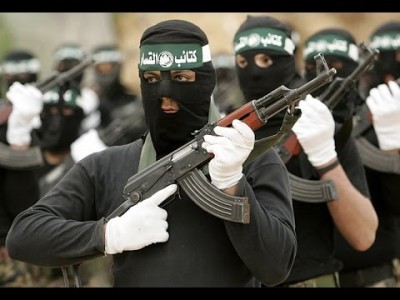Al Qaeda: Heroes of the American Empire

Syrian President Bashar al Assad would seem like a natural ally to the United States and the European Union. He heads a secular government and presides over a secular nation. It is a nation where extremist political factions like the Muslim Brotherhood are outlawed and armed terrorist groups hunted down and eliminated. There was even a point in history before the 2011 war began within and along Syria’s borders that Washington even feigned such an alliance with Damascus.
The London Telegraph in its article, “John Kerry and Bashar al-Assad dined in Damascus,” reported:

Mr Kerry visited Damascus in February 2009, when he was chairman of the Senate Foreign Relations Committee.
He said in a press conference during the visit: “President Barack Obama’s administration considers Syria a key player in Washington’s efforts to revive the stalled Middle East peace process.
“Syria is an essential player in bringing peace and stability to the region.”
Mr Kerry met with Mr Assad at least six times, and on one occasion – seen in the photographs – dining with the two men’s wives at the Naranj restaurant in central Damascus.
Though the US considered at the time Syria to be a “state sponsor of terrorism,” that was only because of its support of Lebanon’s Hezbollah, not Al Qaeda and its affiliates who the US Army’s own reports indicate the government was working against even during the US occupation of Iraq when Syria was used as an entry point into the country along its southern borders. Ironically, the US Army’s reports would indicate that many of the networks now considered “rebels,” were involved in facilitating Al Qaeda’s transit through Syrian territory into Iraq to kill Americans using Saudi cash.
The Enemy of My Enemy is Me, Myself and I…
Today’s headlines are surreal to anyone who remembers the aftermath and hysteria in Washington in the wake of September 11, 2001. Today, the terms “rebels” and “Al Nusra” (Al Qaeda in Syria) are used interchangeably by the US and European press in an attempt to obscure the obvious fact that the very “rebels” the US and its European and Persian Gulf allies are funding, training and arming in Syria are quite literally the terrorist factions these same governments have claimed to be fighting for the past 15 years.
Reuters in a recent article attempting to rhetorically undermine Iran, Syria and Lebanon’s Hezbollah, in one breath mentions the setbacks Al Qaeda’s Al Nusra franchise is dealing to Iranian-backed troops in Syria, and in the next breath points out how Israel is also picking apart Syrian, Iranian and Hezbollah forces.
Titled, “For Iran and Hezbollah, a costly week in Syria,” the article claims:
Reports put the death toll among the Iranian, Afghani and Lebanese militiamen as high as 80 in the attack spearheaded by the al Qaeda-linked Nusra Front.
Then claims:
Israel has not missed the chance to pick off top Iranian and Hezbollah commanders in Syria over the past year or more.
Reuters perhaps hopes readers don’t understand the implications of the actual events unfolding on the ground in Syria versus the empty rhetoric repeated from behind podiums in Jerusalem, Washington, Riyadh, Brussels and London. Indeed, the US and its allies, including Israel, are fighting side-by-side with Al Qaeda in Syria against precisely the same opponents. In fact, Al Qaeda could not sustain its military operations without significant state-sponsorship, state-sponsorship a look at any map will tell someone is coming from Turkey, Israel, Jordan and by implication Saudi Arabia, Qatar, the US and EU.
Perhaps Reuters expects its readers to believe that despite the September 11, 2001 attacks and the many other atrocities attributed to Al Qaeda over the last 15 years are trivial compared to the threat now allegedly posed by Syria, Iran and Lebanon’s Hezbollah.
The phrase “the enemy of my enemy is my friend,” often implies that the friendship is cynically strategic and temporary and with little else beyond a common foe holding the alliance together. In the case of Al Qaeda, it is not an alliance of convenience, Al Qaeda itself is an extension of US-European-Persian Gulf geopolitical ambition. It has been since it was admittedly created in a joint US-Saudi ploy to evict Soviet troops from Afghanistan in a proxy war.
It is no coincidence that Al Qaeda was created to fight proxy wars in the 1980s, and today we find Al Qaeda in its various forms in Syria once again fighting a proxy war.
Reuters and other news services across the US and Europe are celebrating what they call setbacks in Syria for Damascus and its allies, setbacks incurred by Al Qaeda and setbacks anyone with a conscience could not consider cause for celebration. This blatant double game of pretending to fight terrorism while all along propping it up, had until now served the US and its allies well. Today, with the alternative media continuing to expand and challenge such flawed narratives, continuing on with them has cost the US credibility it may never reclaim.
With pressure continuing to mount on the West’s narrative, one can only hope the impetus to act in Syria’s defense among those nations willing and able to send resources to assist will outweigh the impetus the US and its allies have at home and abroad to double down on this bankrupted strategy and the unraveling unsustainable narrative that underpins it.
Ulson Gunnar, a New York-based geopolitical analyst and writer especially for the online magazine “New Eastern Outlook”.

